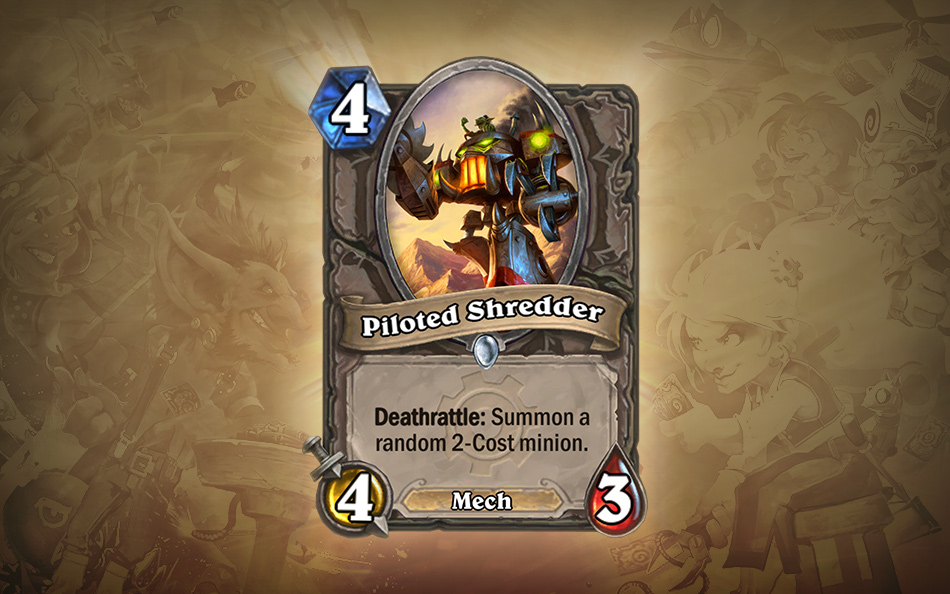Random luck plays a role in all card games, and Hearthstone is no exception to this fact. However, as the expansions have progressed, RNG (Random Number Generator) has begun to have a larger impact on the game as a whole. Probably the best example of this is Piloted Shredder. The card is a 4 mana 4/3 that any class can use, and when it dies it summons a random 2 cost minion, from any class. There are 84 different minions with 2 mana cost that can appear, and they stretch from being as strong as the 4/4 Milhouse Manastorm to as useless as a minion who can’t attack, or as devastating as Doomsayer, a 0/7 minion that says at the start of your turn, destroy all minions. Getting something like that can completely sway the result of a game, and it is entirely luck based.
This sway is exactly what was seen in the recent Gieco hosted tournament One Nation of Gamers, in a semi-final match between Trump, a well-known North American player, and Tom60229, a Korean player. Trump had built himself a nice board and was looking well favoured to win and then his own Piloted Shredder died and spawned a Doomsayer. Tom was given a free turn to draw cards, knowing that his opponent’s board was going to disappear the next turn, and Trump could do nothing but watch as his own minion destroyed everything he had worked for, costing him the match.
Another card that has a similar RNG based effect is Unstable Portal. It is a 2 mana spell that mages can cast, and it puts any random minion into your hand and reduces its mana cost by 3. Obviously this can either be really good or really bad, but the problem is that regardless of result, it is entirely luck based. This card saw play several times through Tom’s play in this tournament. He played Unstable Portal six times throughout the final best of seven series between him and Kolento – another well-known player – and of the six activations, five of the resulting cards were legendary minions, all of which were extremely useful. To put this in perspective, there are 440 minions in Hearthstone that can be fetched using Unstable Portal. 70 of those are legendary. That means there is a 16% chance of getting a legendary if you use one Portal. He got five out of his six, leaving him at well under a 1% chance. This left Tom with such a big advantage and Kolento such a big disadvantage, that Tom was able to take the series, winning $10, 000.
This display of incredible luck caused many spectators to be in an uproar. Trump, one of the victims of RNG in this case, put out a video stating that while he may have been unlucky, he has no issue with the state of RNG in Hearthstone, but this didn’t sway many of the fans who felt as if they had a good series stolen away from them by RNG. So where does this leave them? There has been talk of certain cards being banned from future tournaments, much like many cards are banned in physical card games such as Magic the Gathering. In fact, over a year ago one card, Leeroy Jenkins, was banned from several tournaments because it was believed to be simply too overpowered to create a positive playing atmosphere. Now many of the fans are clamouring to have RNG-free tournaments. It remains to be seen if this will actually end up happening.
The real question is, why is RNG suddenly such a huge issue? It has always existed in Hearthstone and all other card games. In fact, it is the very nature of the card games themselves. So why is it such a huge issue now? One Reddit user: TheDMWarrior sought to answer this question and put together many stats regarding RNG throughout the expansions (found here: http://teammetaminds.com/blog/lets-talk-rng). What they found was that the actual number of cards including elements of RNG has been decreasing recently, the amount of RNG involved in them has ramped up considerably. All of the random numbers in the original set were from a specific card pool or with clear possibilities visible. For example, Knife Juggler randomly hits a target, but it has to be a target in play on the opponent’s board. It is random, but with a very limited number of possibilities. Animal Companion creates one of three beasts. Random, but only on the 33% front. Most of the original cards had RNG like this. Then the newer cards have RNG that pulls from pools of 84 cards, like Shredder, or 440 cards, like Unstable Portal. At this point, these cards can no longer be played around, their RNG is so incredible that it feels less like predicting odds and playing intelligently and more like pure luck.
So what is the solution? Are we going to see tournaments with absurd RNG based cards banned? Is Blizzard going to retroactively change some of these cards? Or, far more likely, are we going to go forward with RNG in mind and be excited about incredibly lucky Unstable Portal legendary minions? Whatever happens, Hearthstone is certainly an exciting game, and regardless of RNG skilled and deserving players, Tom60229 included, will eventually come out on top.
